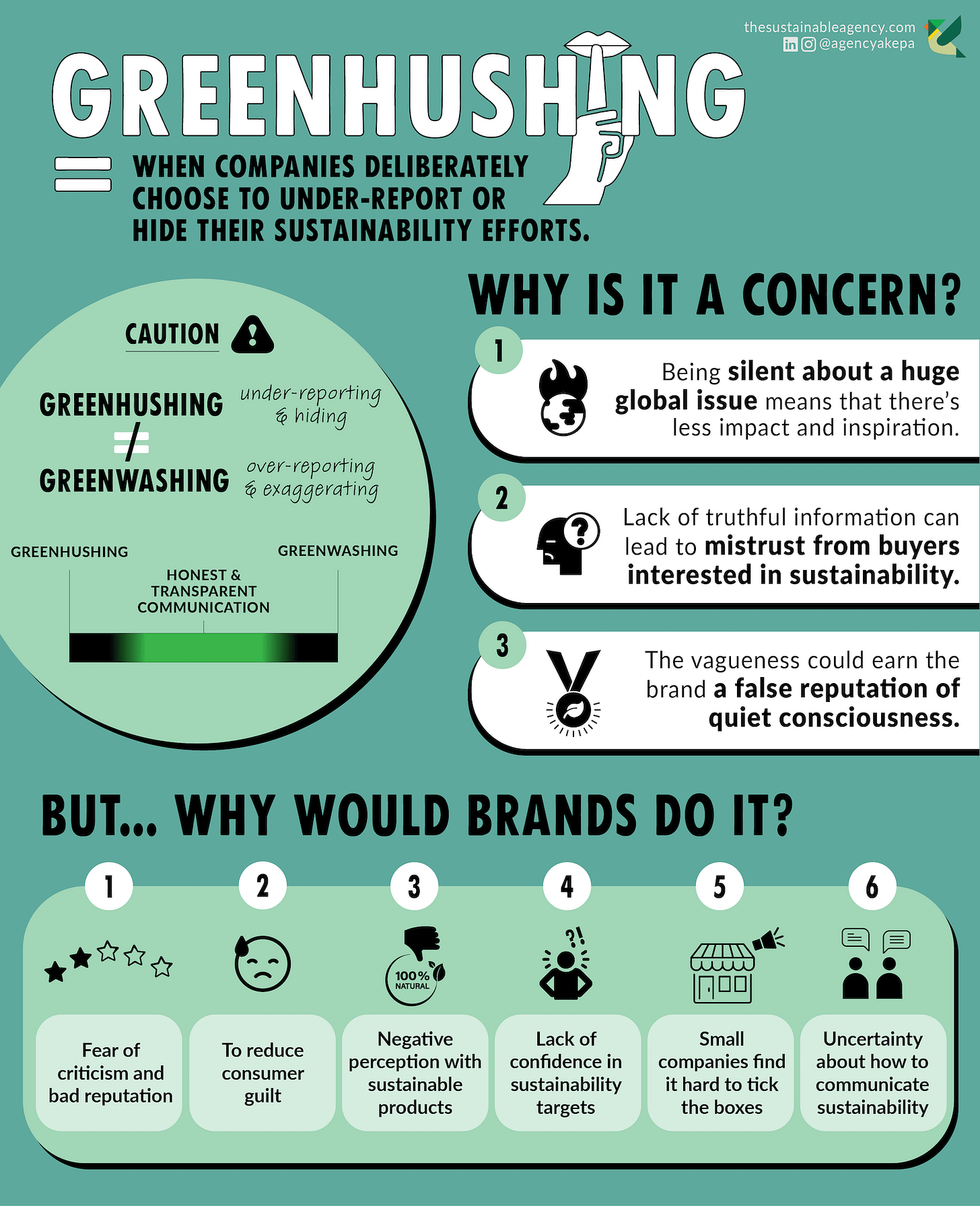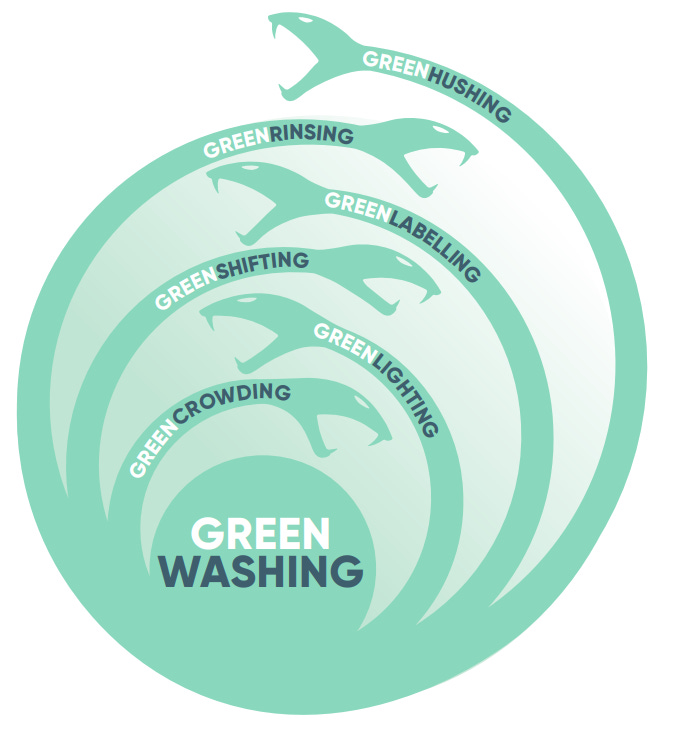“Hush, hush!”
Are you team Deep Purple or team Kajagoogoo?
“Weird comparison. Why?”
Well, cause this episode of Terreminder will analyze the phenomenon of “Greenhushing”.
Yes, you heard that right.
Not Greenwashing. That term we know by now. It was first coined in 1986.1
Greenhushing is a more recent attempt to “pull the wool over our eyes.”2 Apparently, Jerry Stifelman and Sami Grover coined the term in 2008.3
Today, we’ll have a closer look at it.
What is Greenhushing?
Greenhushing is when organizations underreport or hide their climate credentials in order to avoid public scrutiny.4 They hesitate to communicate their environmental actions5 - something that has been happening more often recently.
The thing is: Many stay quiet on purpose, while some actually do it unintentionally.
Why the hush?
Organizations (let’s call them companies) do not want to be called out if they miss their sustainability targets. They want to avoid Greenwashing accusations.
But there’s actually more to it:6
From the company’s perspective, it can seem quite reasonable to stay quiet about its climate goals:
it does not help a company to be truly transparent
companies do not want to brag about their goals
companies want to avoid the risk of omitting information
These factors lead many companies to one conclusion:
“Let’s just not mention it.”
In a sense, Greenhushing is a reaction (and the opposite) to Greenwashing and the growing public scrutiny around it. In quite a few cases, it might just be an attempt at avoiding Greenwashing accusations.
In 2022, Swiss-based agency South Pole conducted a large survey on 1,200 large corporations across 12 countries.7 They all had net zero targets.
Two thirds were “heavy emitters”. Yet 23 % percent of them did not plan on reporting their science-based climate targets.
Source: Akepa
Why do they STFU?
The main reason for Greenhushing is FEAR.
The fear of criticism and reputational damages. No company wants to be called out for Greenwashing or alleged hypocrisy.8
Green ambitions were a thing just a few years ago. Today, the situation is different. Silence can protect a company from scrutiny.
Many companies also fear potential Greenwashing lawsuits as regulators are catching up with the phenomenon all over the world.9
That’s all?
Some firms just want to keep their customers happy, even if that means to reduce their climate guilt. Positive vibes onlyyyy…10
Then there is brand psychology. Sustainable products are sometimes perceived as being of lower quality. People tend to think of them as “undesirable trade-offs.”11
Some companies simply stay silent on their goals because they are not confident in meeting them. They might just want to wait for the result and THEN announce a plan. Smaller companies in turn might not have the resources to realize ambitious claims.12
“If I’m the first company to go net-zero then I get more press for it, if I’m the 347th company to go net-zero, nobody cares,” (...) “And if I’m the 1,500th company then I’m actually seen as a laggard.”
Jason Jay, MIT Sloan
(Cute quote, might delete.)13
Big claims, big expectations.
No wonder many companies turn down the volume.
Greenwashing and Friends
Planet Tracker’s “The Greenwashing Hydra” gives a great overview of all the various forms of Greenwashing that companies have come up with.14
Greenwashing: The classic. Companies making exaggerated claims about their environmental efforts.
Greencrowding: Companies hiding in a group and moving at the pace of the slowest sustainability adapter.
Greenlighting: A company spotlights a single, particularly green feature of its operations to deflect from various other environmentally damaging activities.
Greenshifting: When a company implies that the blame is actually on the consumer, not on the firm’s own product or service.
Greenlabelling: When companies label their products “green”, “natural”, or “sustainable”, yet closer examination reveals they are not.
Greenrinsing: A company that changes its ESG targets more often than its underwear.
Are we doing anything about it?
Media coverage around sustainability has intensified - certainly a reason for why many companies hesitate to publicize a Green Transition plan.15
The good news: Governments and regulators are starting to wake up. This includes the UK, the EU, the US, Australia, Singapore, Japan or Malaysia.
According to EU Commission estimates, around 53% of companies’ environmental claims carry "vague, misleading or unfounded" information, while 40% are "completely unsubstantiated."16
Conclusion
“The gift that keeps on giving.”
Just not what we want.
That’s how you could describe the whole Greenwashing issue.
Just when we thought there was enough public awareness and scrutiny regarding Greenwashing, several other forms pop up.
But the reasons for Greenhushing are to some extent rational.
Time to create a culture of transparency and honesty.
Time to admit your company’s imperfection without using it as an excuse.
But also high time to realise and accept the fact that a Green Transition will not happen within 24 hours. It will take a lot more time.
Most companies are moving in the right direction.
But are they doing all they can? Probably not.
So let’s push companies to stay ambitious, transparent, and honest.17
Let’s make them talk the talk and walk the walk.
Thanks for your time and see you next week.
Lennard
PS: Did you know that about 160 companies are responsible for about 80% of global emissions?18
Ibid.
Ibid.





